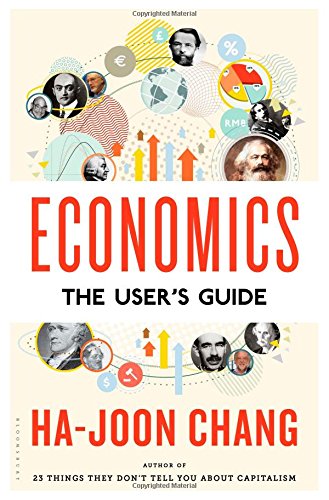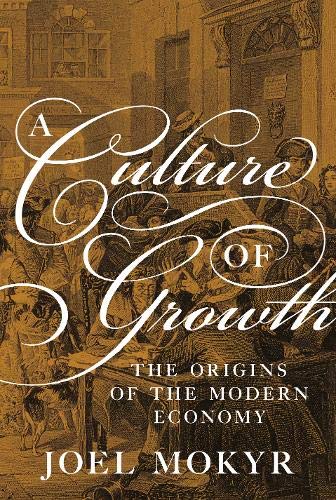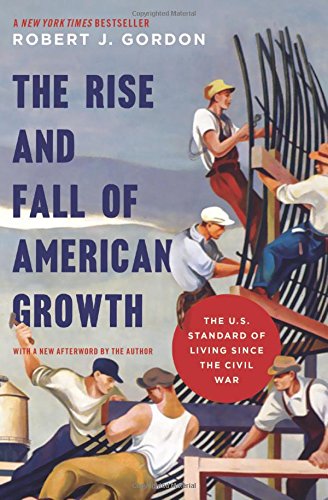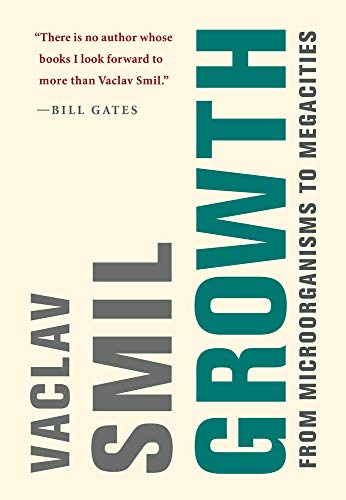
1

2

3

4

5
This list represents opposing views in the debate over economic growth. From optimists who see rapid innovation, to pessimists who sense years of stagnation, this list will give you plenty to think about.
1
"History also forces us to question some assumptions that are taken for granted...When you learn that the advanced capitalist economies grew the fastest in history between the 1950s and the 1970s, when there were a lot of regulations and high taxes, you will immediately become sceptical of the view that promoting growth requires cuts in taxes and red tape. History is useful in highlighting the limits of economic theory. Life is often stranger than fiction, and history provides many successful economic experiences (at all levels - nations, companies, individuals) that cannot be tidily explained by any single economic theory."
2
Joel Mokyr argues that a "culture of growth" laid the foundations for the scientific advances and pioneering inventions that would instigate explosive technological and economic development. Bringing together economics and history, Mokyr demonstrates that culture is a deciding factor in economic growth. Mokyr has long studied how new tools have led to economic breakthroughs. For example, how the development of telescopes allowed for rapid advances in astronomy. History makes him certain the pessimists are wrong.
3
Robert Gordon sees a hobbled U.S. economy ahead. Americans are getting older, leaving too few workers to support the aging population. Gordon argues that economies need technological advances to compensate. The problem is that the biggest breakthroughs—like electrification or the discovery of antibiotics—are behind us. More recent inventions—including the Internet—won't pack the same punch: "The rapid progress made over the past 250 years could well turn out to be a unique episode in human history."
4
In Stubborn Attachments, the economist Tyler Cowen offers a smartly argued defense of economic growth. In fact, the title itself is a reference to the idea we need a more “stubborn attachment” to prosperity and freedom. Here are 2 key quotes: 1) Robert E. Lucas, Nobel Laureate in Economics, put the point succinctly: “Once one starts to think about [exponential] growth, it is hard to think about anything else.” 2) “The history of economic growth indicates that…growth alleviates misery, improves happiness and opportunity, and lengthens lives. Wealthier societies have better living standards, better medicines, and offer greater personal autonomy, greater fulfillment, and more sources of fun.”
5
Perhaps the most interesting part of the book is the debate over the source of economic growth. Naturally, this involves Joel Mokyr and Robert Gordon, two economists who embody drastically different visions. Robert Gordon, for his part, questions the “fundamental Solowian assumption of economic growth.” By contrast, Joel Mokyr has “almost unlimited confidence” in our ability to keep growing. Mokyr also champions Enlightenment ideals, which he argues had more influence on growth than technical advances or business practices. Ultimately, Smil concludes that continuous growth is “impossible” and doing more with less “cannot remove this constraint.” Further, he says we must take a “radical departure” from the status quo in order to avoid catastrophe.

1
"History also forces us to question some assumptions that are taken for granted...When you learn that the advanced capitalist economies grew the fastest in history between the 1950s and the 1970s, when there were a lot of regulations and high taxes, you will immediately become sceptical of the view that promoting growth requires cuts in taxes and red tape. History is useful in highlighting the limits of economic theory. Life is often stranger than fiction, and history provides many successful economic experiences (at all levels - nations, companies, individuals) that cannot be tidily explained by any single economic theory."

2
Joel Mokyr argues that a "culture of growth" laid the foundations for the scientific advances and pioneering inventions that would instigate explosive technological and economic development. Bringing together economics and history, Mokyr demonstrates that culture is a deciding factor in economic growth. Mokyr has long studied how new tools have led to economic breakthroughs. For example, how the development of telescopes allowed for rapid advances in astronomy. History makes him certain the pessimists are wrong.

3
Robert Gordon sees a hobbled U.S. economy ahead. Americans are getting older, leaving too few workers to support the aging population. Gordon argues that economies need technological advances to compensate. The problem is that the biggest breakthroughs—like electrification or the discovery of antibiotics—are behind us. More recent inventions—including the Internet—won't pack the same punch: "The rapid progress made over the past 250 years could well turn out to be a unique episode in human history."

4
In Stubborn Attachments, the economist Tyler Cowen offers a smartly argued defense of economic growth. In fact, the title itself is a reference to the idea we need a more “stubborn attachment” to prosperity and freedom. Here are 2 key quotes: 1) Robert E. Lucas, Nobel Laureate in Economics, put the point succinctly: “Once one starts to think about [exponential] growth, it is hard to think about anything else.” 2) “The history of economic growth indicates that…growth alleviates misery, improves happiness and opportunity, and lengthens lives. Wealthier societies have better living standards, better medicines, and offer greater personal autonomy, greater fulfillment, and more sources of fun.”

5
Perhaps the most interesting part of the book is the debate over the source of economic growth. Naturally, this involves Joel Mokyr and Robert Gordon, two economists who embody drastically different visions. Robert Gordon, for his part, questions the “fundamental Solowian assumption of economic growth.” By contrast, Joel Mokyr has “almost unlimited confidence” in our ability to keep growing. Mokyr also champions Enlightenment ideals, which he argues had more influence on growth than technical advances or business practices. Ultimately, Smil concludes that continuous growth is “impossible” and doing more with less “cannot remove this constraint.” Further, he says we must take a “radical departure” from the status quo in order to avoid catastrophe.
© Five Books 2024